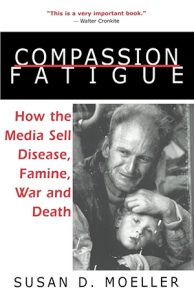Compassion Fatigue: How the Media Sell Disease, Famine, War and Death

Author: Susan D. Moeller
Publisher: Routledge
Year of Publication: 1999 (First Edition)
Print Length: 400 pages
Genre: Non-Fiction / Social Science, Arts & Humanities
Area: The United Kingdom (UK), Ethiopia, Bosnia and Herzegovina, Zaire (Now Democratic Republic of Congo (DRC)), Iraq, South Asia, India, Pakistan, Middle East, Egypt, Palestine / Israel, Rwanda, Somalia, Sudan, South Sudan
Topic: Compassion Fatigue, Compassion, Burnout, Media & Narratives, Visual, Representation, Disease, Famine, War, Civil War, Death & the Afterlife, Ethics & Morality, Torture, Violence & Mass Violence, Deportation, Ethnic Cleansing, Execution, Genocide, Iraqi, Kurds
In Compassion Fatigue, Moeller warns that the American media threatens our ability to understand the world around us. Why do the media cover the world in the way that they do? Are they simply following the marketplace demand for tabloid-style international news? Or are they creating an audience that has seen too much—or too little—to care?
Through a series of case studies of the “Four Horsemen of the Apocalypse”—disease, famine, death and war—Moeller investigates how newspapers, news magazines and television have covered international crises over the last two decades, identifying the ruts into which the media have fallen and revealing why.
“Moeller’s patient dissection of media is a penetrating analysis, concluding that after more and more death and war, disease and worse, consumers just get tire of caring. Change is needed.” — Morton Times-News
Table of Contents
Introduction: Riding with the Four Horsemen
ONE. COMPASSION FATIGUE
The Practice of Journalism and Compassion Fatigue
Images and Compassion Fatigue
TWO. COVERING PESTILENCE: SENSATIONALIZING EPIDEMIC DISEASE
Mad Cows and Englishmen: Creutzfeldt-Jakob Disease, Britain, March 1996
The Doomsday Disease: Ebola, Zaire, May 1995
THREE. COVERING FAMINE: THE FAMINE FORMULA
The Archetypal Media Famine: Ethiopia, Fall and Winter
Just How much of a Disaster Does a Disaster Have to Be? Sudan and Somalia, 1991-1993
FOUR. COVERING DEATH: THE AMERICANIZATION OF ASSASINATIONS
Death in the Indian Subcontinent: Indian Prime Minister Indira Gandhi, Wednesday, October 31, 1984, & Pakistani President Mohammad Zia ul-Haq, Wednesday, August 17, 1988
Death in the Middle East: Egyptian President Anwar el-Sadar, Thursday, October 6, 1981, & Israeli Prime Minister Yitzhak Rabin, Saturday, November 4, 1995
FIVE. COVERING WAR: GETTING GRAPHIC ABOUT GENOCIDE
Poison Gas, Deportation and Execution: Iraq’s “Anfal” Campaign Against the Kurds, February-August 1988
“Ethnic Cleansing”: The “Death Camps” in Bosnia, August 1992
“Acts of Genocide”: Rwanda, April-August 1994
Conclusion
Notes
Acknowledgments
Index

Susan D. Moeller is the director of the International Center for Media and the Public Agenda (ICMPA), an academic center that forms a bridge between Merrill College and the University of Maryland School of Public Policy. She is professor of Media and International Affairs at Merrill College and an affiliated faculty member at the School of Public Policy. In 2008, Moeller was the recipient of two major awards: a Carnegie Scholar Award from the Carnegie Corporation of New York, a $100,000 grant for research and writing on how media report on the intersection of Islam and terrorism; and the State of Maryland Board of Regents Teaching Award, which recognized Moeller both for her work in the university classroom and for her work in helping to found a new global education program, the Salzburg Academy on Media and Global Change, where she is the co-director and lead faculty member.
Source: https://merrill.umd.edu/directory/susan-moeller
More from Susan D. Moeller in this library, click here.
